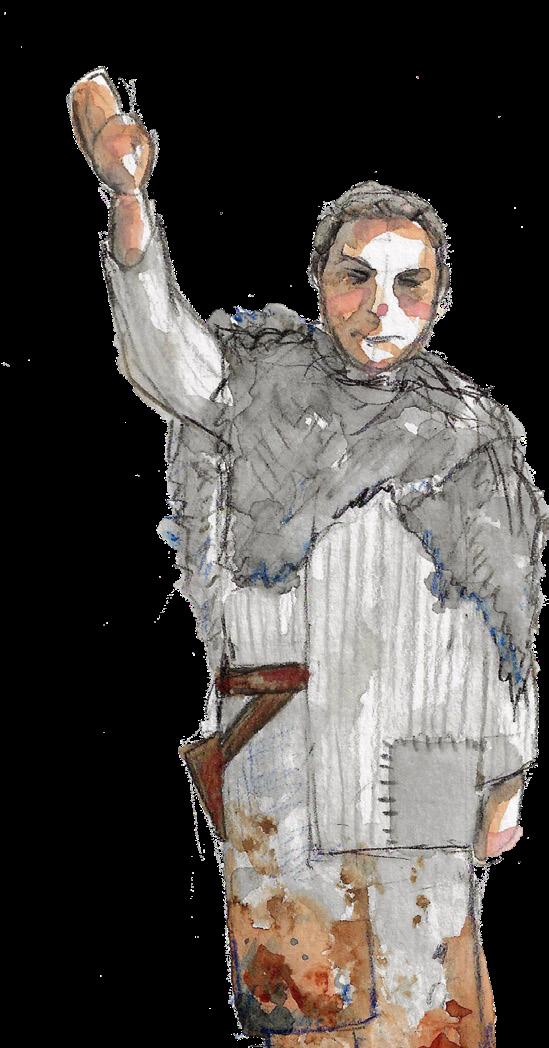
15 minute read
by Sophocles
by
ONEAMERICA MAINSTAGE
FEBRUARY 22 – MARCH 184
Director _______________________________ JAMES STILL
Scenic Designer__________________________ CAREY WONG

Costume Designer___________________ SARA RYUNG CLEMENT
Lighting Designer_________________________ MICHELLE HABECK
Original Music and Sound Design______________ LINDSAY JONES
Movement__________________________ MARIEL GREENLEE
Dramaturg_________________________ RICHARD J ROBERTS
Stage Manager_______________________ NATHAN GARRISON
Casting____________________________ CLAIRE SIMON CSA
LIGHTING DESIGNER: MIchelle Habeck
SEASON 2022-2023
Oedipus_____________ DAVID ALAN ANDERSON
Priest__________________ OLIVIA D. DAWSON
Creon______________________ TRIEU TRAN
Tiresias_____________________ LISA WOLPE
Jocasta_________________ MARY BETH FISHER
Corinthian_______________ RYAN ARTZBERGER
Shepherd____________________ JAN LUCAS
One from Within____________ SOLA THOMPSON Musician/Chorus________________ JED FEDER
Ancient Thebes
APPROXIMATE RUN TIME: 1 hour and 40 minutes.
David Daniel’s adaptation of Oedipus premiered at American Players Theatre in 2021
Fight Choreographer: Leraldo Anzaldua
Music Director: Jed Feder
Dance Captain: Sola Thompson
Fight Captain: Lisa Wolpe
Assistant Scenic Designer: Charlotte Emrys
Assistant Lighting Designer: Arie Jamieson
Understudies: for Oedipus: Ryan Artzberger; for Jocasta: Jan Lucas
Swings: Jean Arnold, Scott Van Wye
Actors and stage managers are members of Actors’ Equity Association, the Union of Professional Actors and Stage Managers in the United States. The director is a member of the Stage Directors and Choreographers Society, a national theatrical labor union. Scenic, costume, lighting, and sound designers are represented by United Scenic Artists Local 829, IATSE.
Photography and recording are forbidden in the Theatre. The videotaping of this production is a violation of United States Copyright Law and an actionable Federal Offense.
Oedipus Rex by Sophocles is widely considered the finest of all Greek tragedies. Like Shakespeare, however, Sophocles did not create his story. The myth of Oedipus originated in the Theban Cycle, a lost epic of Ancient Greek literature that predated the Iliad and the Odyssey. Just as these two sagas tell the story of Troy, the Theban cycle tells the story of the Greek city of Thebes.
The mythic Oedipus is raised in Corinth as the son of King Polybus and Queen Merope. When the Oracle at Delphi tells Oedipus that he is fated to kill his father and marry his mother, he leaves Corinth to escape such a terrible prophecy.
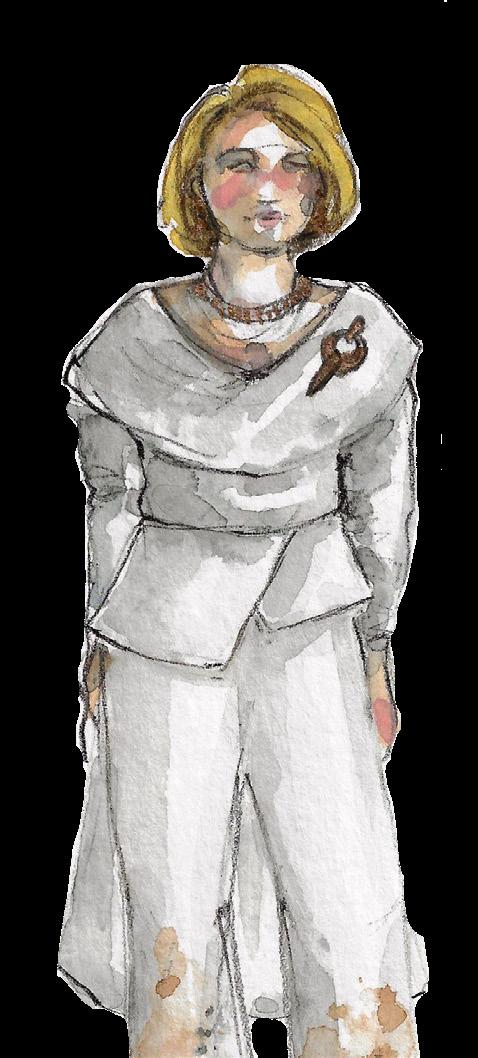
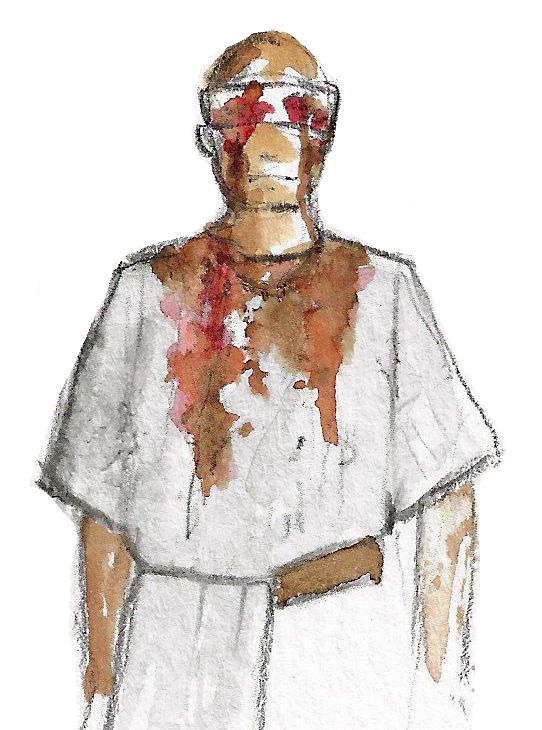
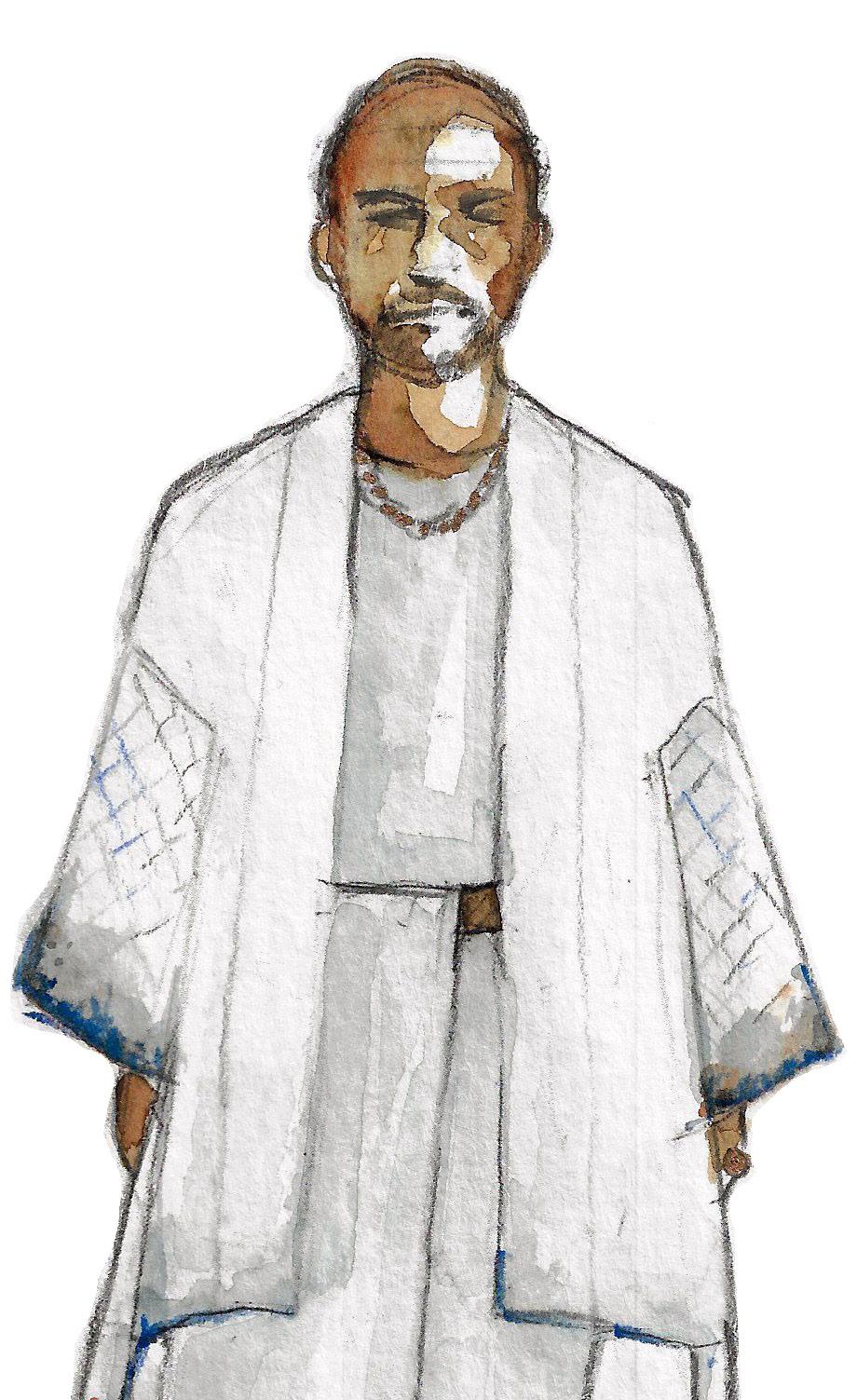
Arriving in Thebes, Oedipus discovers a city terrorized by the Sphynx. The Greek Sphynx has the head of a woman, the body of a lion, and the wings of a bird; it is a demon of destruction and bad luck. The Sphinx has commandeered the gate of Thebes, challenging anyone who tries to enter or leave the city to answer a riddle: “What walks on four feet in the morning, two feet at mid-day, and three feet at night?” Those who cannot answer the riddle—and not one person has yet answered it—are eaten by the Sphynx. Oedipus, however, figures out the answer: Humans. As infants, they crawl on all fours; as adults, they walk upright on two feet: in old age, they walk with canes. In some versions of the legend, Oedipus kills the Sphynx; in other versions, the Sphynx throws itself off a cliff or eats itself.
Oedipus is rewarded for rescuing Thebes by marrying Queen Jocasta, recent widow of King Laius. Together, Oedipus and Jocasta have two sons and two daughters. King Oedipus is much loved by the populace. But after several years, a plague strikes the city, bringing disease to people, livestock, and crops. Oedipus sends his wife Jocasta’s brother Creon to Delphi to consult the Oracle for help. This is where the play OedipusRexbegins.
Creon returns with the Oracle’s pronouncement: the murderer of King Laius must be found and brought to justice. Oedipus curses the killer and vows to find him and exile him. Creon suggests consulting Tiresias, a highly respected seer, who warns Oedipus to stop the search. In a heated argument, Tiresias accuses Oedipus himself of the crime. Oedipus charges Creon and Tiresias with conspiring against him. Queen Jocasta tries to stop the fight between her brother and her husband. The circle of witnesses expands to include a man from Corinth, who arrives with fateful news about King Polybus, and a shepherd who hides a terrible secret. In the end, Oedipus’s curse is fulfilled, to the horror of all who see.
South African social rights activist and Archbishop Desmond Tutu explained the philosophy of ubuntuas, “My humanity is bound up in yours, for we can only be human together.” It manifests the idea that humans cannot exist in isolation. We depend on connection, community, and caring. We add to and aid our communities. We march, we fill sand bags, we raise money, we help rebuild, we pitch in, we volunteer, we go to funeral services, we hug each other, we make casseroles…. In times of tragedy, we have a desperate need to do for each other. The poet, soldier, and clergyman John Donne wrote, “No man is an island entire of itself; every man is a piece of the continent, a part of the main.”
Some of you reading this have been coming to IRT for years. You’ve given your time, donated your money, dragged your friends…. IRT is because of who you are.
For many artists, IRT was their first job. It has been a part of divorce, marriage, birth, death, family, retirement … and through it all, IRT has helped shape the lives of the people who are a part of it. They are because IRT is.
You and we are bound together by this place.
Oedipus and his Thebes are bound together. Their journey and suffering is shared. And like us all in times of need and pain, they, like us, will get through it together.
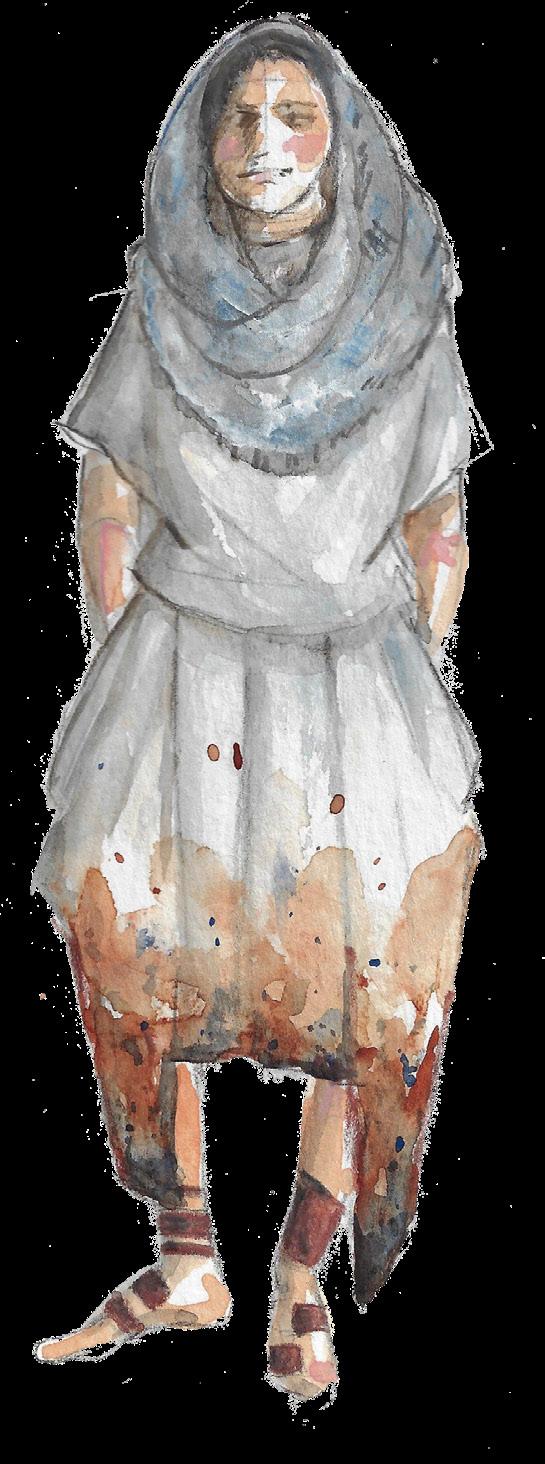
There is so much in this play. There is a murder mystery, a love story between a leader and his people, a treatise on hubris, a debate of divine morality, a tug of war between Fate and Free Will, an invitation to Sunday tea with Nihilism, and so much more. The production you are about to see is our contribution to that conversation.
I would like to add, as an adapter, that there were and are so many voices that have shaped my own. Langston Hughes, Christopher Logue, Maya Angelou, Anne Carson, Seamus Heaney, Ellen McLaughlin, Oscar Wilde, Madeline Miller, Stephen Vincent Benet, my mother, my father, fellow vets (all storytellers in their own wonderful ways), and thousands of writers and poets on line and in schools, churches, poetry cafes, and prisons whose written and spoken words have filled my ears and soul for decades.
I am because they were.
The place of Oedipus in literature is something like that of the Mona Lisa in art. Everyone knows the story, the first detective story of Western literature; everyone who has read or seen it is drawn into its enigmas and moral dilemmas. It presents a kind of nightmare vision of a world suddenly turned upside down.… It is a story that, as Aristotle says in the Poetics, makes one shudder withhorrorandfeelpityjustonhearingit.InSophocles’s hands, however, this ancient tale becomes a profound meditation on the questions of guilt and responsibility, the order (or disorder) or our world, and the nature of man. The play stands with the Book of Job, Hamlet, and King Lear as one of Western literature’s most searching examinations of the problem of suffering.
—Charles Segal, Oedipus Tyrannus: Tragic Heroism and the Limits of Knowledge
“A nightmare vision of a world….” Aren’t we living that sufficiently in today’s “upside down” world? A fair question—but one that moves right into the heart of the belief we hold that art can lift and expand our daily lives through metaphor. While none of us aspires to live like Oedipus, his story gives us great insight into the breadth of human capacity for the unrelenting search for truth, and into the zealous desire of a good leader to protect their community from harm.
So why Oedipus now? A perfect storm of good reasons. First, I found a translation that opens the play to American audiences. For many years I have searched for a translation/adaptation that would meet us where we are (rather than hoping that we are all as encyclopedic about Greek divinity as the Ancient Greeks were). About a year ago I finally found David Daniel’s extremely sleek and actable version that makes the story spring to life in thrilling ways. Then we were able to secure David Alan Anderson to play the lead and James Still to direct, and to draw around them a remarkably accomplished group of actors and designers willing to walk undaunted in the labyrinth where this play lives in Western culture.
Even when one has great circumstances like these, the Greek plays require some crazy carpe diem to take them on. They are the Mount Everest of our Western theatrical literature, the most primal, the oldest, the most elemental, the greatest challenge—and therefore the most daunting to take on. I happen to have a large dose of that this year, in my last season before retirement, so carpe diem it is!
Oedipus has tremendous resonance to our troubled time: its inciting incident is a plague that has taken over the city. Oedipus, the King, vows to the populace to lift the plague by whatever means necessary— without knowing that this vow dooms him. The play is a study in leadership, and since we live in a country so riven by opposing views of what constitutes good leadership, this is a particularly timely debate. While Sophocles would have laughed to think that Oedipus would ever become a role model—characters, after all, are metaphors, not real people—Oedipus has become an endlessly exciting psyche to dissect. His motives both as a man and a leader have inspired constantly evolving definitions of humanity by philosophers, artists, and eventually, of course, psychoanalysts. (Freud and Nietzsche are the ones who really made Oedipus a household name). Plays call to us as artists at various moments in time, and Oedipus calls both artists and audiences to gain huge perspective about humanity’s soaring hopes and harrowing failings. The play shows us how humanity can strive for truth—and how it can fall when that truth is revealed.
Philosopher Joseph Campbell writes in his book The Power of Myth (based on the PBS series) something that rings hugely true about Oedipus:
Mythology is not a lie, mythology is poetry. It is metaphorical.Ithasbeenwellsaidthatmythologyisthe penultimate truth—penultimate because the ultimate cannot be put into words. It is beyond words. Beyond images,beyondtheboundingrimoftheBuddhistWheel of Becoming. Mythology pitches the mind beyond that rim,towhatcanbeknownbutnottold.
Sophocles’s story was so familiar to its original audience that they knew its ending and its every twist and turn even before the play began. Yet they flocked to see this story staged over and over, in many plays by many different writers. What were they seeking? The same things we seek in our quest for art that resonates and expands our hearts and minds. We all want answers, or at least shreds of answers, to the ultimate question: What is it to be human? What can we glean from standing with Oedipus as he wrestles with his own humanity, with his own quest for truth? We at the IRT hope you find in this production some new shreds of answers as you consider your own humanity. How can we live through our own triumphs and tragedies, and emerge enlightened, and more at peace with our striving souls?
Something to know about me: I like old things. I like old souls, old cars, old music, old photographs, old scars…. Ironically, I don’t like a lot of old plays, but it turns out I may love ancient ones. Oedipus is ancient. Sophocles may have been the Tony Kushner or Arthur Miller of the 5th century BCE, but the plays he wrote vibrate and shimmer with a different kind of currency than contemporary plays.
Working on our production, I’ve wrestled with some of the same things I suspect you might wrestle with as well. The nagging anxiety that pulses under the surface of the play is laid bare by the tension between fate and free will. At first that might seem like a dusty, irrelevant thesis crammed somewhere between a required college lecture and our ancestors’ lack of sophistication. But in my own wrestling with the play, I’ve discovered that the ways that fate and free will are emotionally at war with one another in Oedipus aren’t that far from our modern-day struggles with conflicting extremes.
On the one hand, it seems very American to believe in free will and self-determination: that idea that if we work hard enough, or do the “right” things at the right time, that we will be amply rewarded with generous agency. But that quintessential belief that we are the architects of our future is often pitted against the old adage related to fate: “everything happens for a reason”—which is a spin on “it’s out of my hands” or “what will be will be.…”
Some have said that Greek tragedies are about people who learn too late. For me, Oedipus is about a knot that ties various extremes together, and the terror and suffering that result from not knowing when to leave that knot alone. It’s tempting to wonder what was coursing through Sophocles’s mind when Oedipus came provocatively pouring out. Did he have any idea that his play would survive more than 2,500 years? There’s something profound (and disturbing) about something imagined so long ago that is still needed and still worthy of witnesses like you and me.
One thing I can offer as context, that might help you open your own hearts and lens to this ancient play: there is a difference between identifying with a character and investing in that character. As contemporary audiences, we’re conditioned by mystery stories that are logically solved by applying cause-and-effect: TV mysteries that have been reduced to familiar formulas, legal procedurals that have just enough psychological shadows that we’re able to put ourselves in the shoes of outsiders and monsters. We have names and diagnoses that help us justify the worst of humanity.
Sophocles pitched something similar but with a very different form—something new to those first audiences in Ancient Greece, who must have cheered and recoiled as characters on an outdoor stage wrestled with their gods and monsters. It’s too easy to simply dismiss Oedipus (the character) as the last one to figure out what may seem perfectly obvious to all of us. It’s too easy for us to feel superior.
Instead, I urge you to watch/listen/feel the story of Oedipus, as it unfolds with unrelenting directness. Imagine you’re on the inside of someone’s head, where reason is on a collision course with hubris, where logic utterly fails to cooperate when we need it most. It seems deeply human to deny the obvious until it’s no longer deniable—until you’re left with the despair that comes with the tragic knowing that the monster you’re pursuing is actually yourself.
The play asks us to invest in Oedipus and to watch his life unspool right in front of us in uninterrupted time. Oedipus is unable to undo the curse placed on him as an infant. He’s unable to stop the story—and neither are we. Even if we’ve figured out the ending long before he does, the point is that we witness how power and heroism can quickly crumble. Put another way: it might take a long time to rise to power and sustain that power, but it takes surprisingly little time—time we never get back—for that same power to turn tragic.
Highly educated, he was elected to several political offices during his life in Athens, including treasurer, executive official, and commissioner. Several anecdotes from his contemporaries indicate that he was a homosexual. Sophocles wrote more than 120 plays for the annual Athens dramatic festival. He competed in 30 festivals, winning
24, and placing second in the other six. Only seven of his plays have survived, of which the most famous are Oedipus Rex—often considered the greatest example of tragedy— and Antigone. Sophocles created characters of greater depth than previous playwrights. He increased the number of actors in a play from two to three—each playing multiple roles—thus reducing the importance of the chorus and increasing opportunities for conflict and plot development.
The golden age of Greek theatre occurred between 500 and 400 BCE, when Athens was considered the intellectual and cultural center of the world. This is the same century as when the Parthenon was built.
Athens was a democracy, and its citizens viewed justice in terms of chaos and balance. This democratic structure was essential to the development of theatre: drama is the process of chaos restored to balance. The subject of the ancient Greek plays is the role of the individual in society. The emphasis is on character: seeking to know oneself through action. Freedom is the ability to think clearly, to see one’s place in the natural order. We are defined by what we have in common. These ideas form the core of tragedy and the tragic hero.
In ancient Greece, there were very close ties between theatre and religion. This relationship can be seen in the location of Greece’s most important theatre on the side of the Acropolis, in the very shadow of the most sacred site in Athens. Hymn-singing worshippers of Dionysus, the Greek god of wine and fertility, began to organize choral competitions. According to legend, Thespis was the first person to step out from the chorus and sing solo, thus becoming the first actor. It is from his name that we get the term thespian.
Greek theatre was presented in four week-long sociopolitical-religious festivals held every year. Plays were performed in competition, with a panel of judges from the common people. The winning poet was honored for his victory and treated as a civic hero. The Greek poetplaywright wore many hats: writer, composer, producer, director, choreographer, and sometimes even actor.
The Greek chorus, descended from the Dionysian choral competitions, was a group of a dozen performers who portrayed the community in the play: groups of citizens, civic leaders, jurors in a trial. They posed questions and addressed prayers to the gods, dancing and speaking rhythmically. The individual characters of the play were all performed by just three actors, changing costumes and masks to create each new character.
Every city in Greece had a stone amphitheatre built into a hollow space on the side of a hill. At the center of the amphitheatre, surrounded by rings of stone benches on three sides, was a large flat circular space where the chorus performed. This dancing place was known as the orchestra. On the open side of this space was a structure called the skene, where the actors could change costumes and masks. The skene was also used within the action of the play: it might serve as an entrance to a house or a temple, or the roof might be used for the entrance of a god. The space where the audience sat was called the theatron, which meant “the seeing place.” This is the origin of our word theatre.
Although the skene represents the beginnings of scenery, scholars debate whether or not the Greeks attempted to create illusions of different locations. Battle scenes and deaths always occurred offstage; they were described by the characters and largely left to the audience’s imagination. The vista of town and countryside beyond the skene was important, integrating the individual with the community and the community with nature, illustrating the natural order of things.
Although more than a thousand plays were written during the Greek golden age, only 44 plays by four or five playwrights have survived. The most famous of these is Oedipus Rex (Oedipus the King) by Sophocles, who created the tragic hero as we know him, and who developed the concept of the tragic flaw.
Oedipusis a prime example of irony: the disjunction between what seems to be true and what isn’t true. Even though we meet Oedipus as a powerful king, his tragic fate is sealed long before the play begins. In many ways, Oedipus is structured like a mystery play—a whodunit. Throughout the play, Oedipus ignores the clues that point to himself and continues his pursuit of the truth.
The Ancient Greeks used theatre as a tool to teach moral lessons. Most plays—ancient and modern—tend to accept society as the norm and highlight the individual who falls outside that norm. Comedy teaches through poking fun at those who don’t follow social rules. Tragedy instructs by dramatizing how the hero handles crises. Oedipus warns us that we cannot escape our destiny. Today, as we debate issues of nature vs. nurture or genetics vs. environment, the play’s discussion of fate vs. free will continues to resonate.
For the 2002-2003 season opener, the Theatre announced it would stage James Still’s He Held Me Grand, the product of the playwright-in-residence’s Millennium Project. “For all of us here, it’s the long-awaited event,” Janet Allen told a reporter. Still had been working since 1998 on the play, which was based on hundreds of oral histories he collected in both Indiana and Pennsylvania, as it became a collaboration with Philadelphia-based People’s Light and Theatre Company. Still said it was “by far the most ambitious play I’ve ever written.”
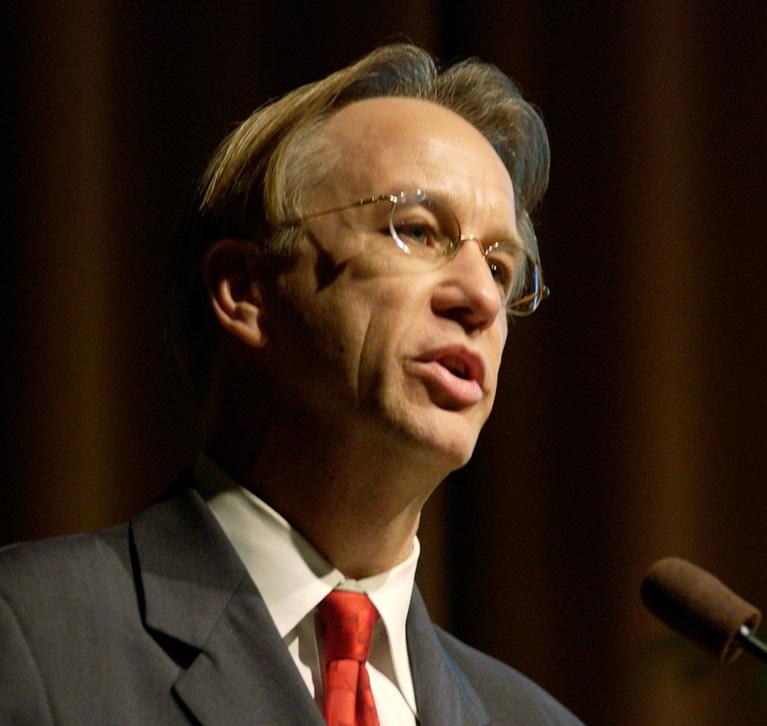
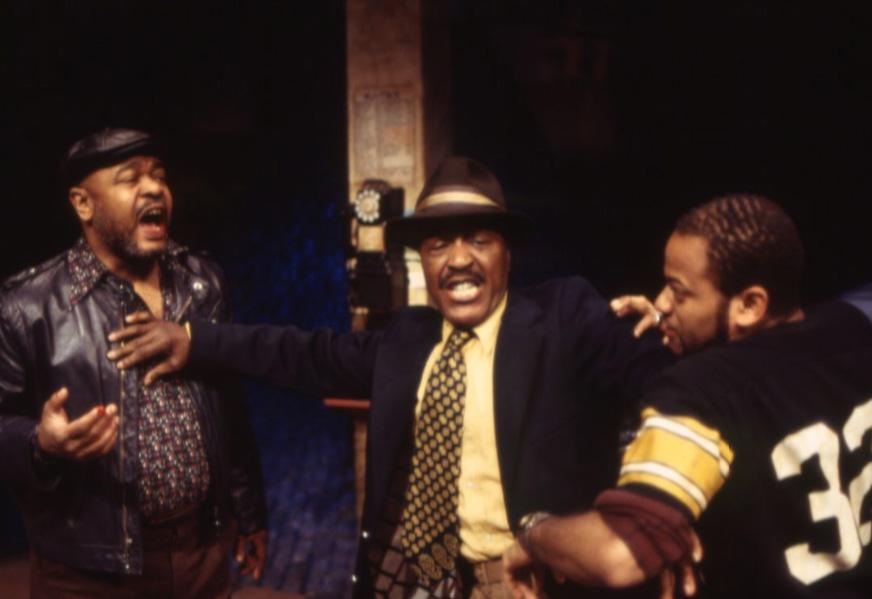
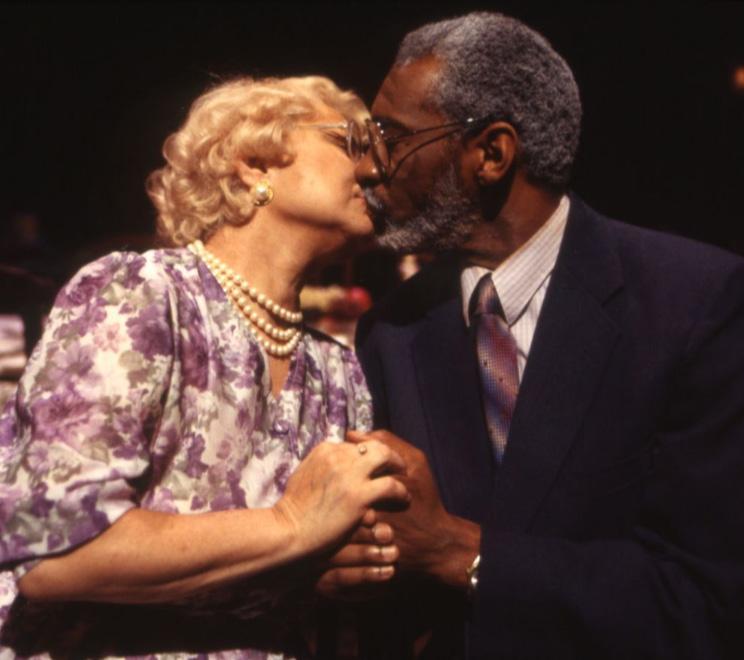
Managing director Brian Payne resigned from the IRT in late 2000. When search committee chair Michael Maine had announced Payne’s hiring in 1993, he said, “The thing that impressed everyone the most was his genuinely boundless energy and commitment to making this the theatre we want it to be. And he expresses it in a way that we all found utterly charming.” Payne enjoyed a complementary—and productive—relationship with artistic director Janet Allen. “Janet and I developed a true partnership and were completely in sync,” he observed. “I wanted some artistic influence, she was clearly attuned to the budget, and we shared a commitment to community building—it all made for an ideal team.” Upon leaving the IRT, Payne would remain in the city to lead the Central Indiana Community Foundation.
Frequent IRT costume designer Tracy Dorman: “My first show at IRT was a production of August Wilson’s Jitney in 2003, directed by Timothy Douglas, and I will never forget how the shop built the entire 1970s show, mostly menswear. It was beautiful and meaningful because we created a world onstage that felt exactly right for that show, and it was as beautifully produced as any of the nineteenth century period shows that I’ve done at IRT. As a freelancer, I feel the greatest gift is being able to establish an artistic home where you feel like your vision can be fulfilled. IRT has always provided that for me, and I’m thankful for it.”






